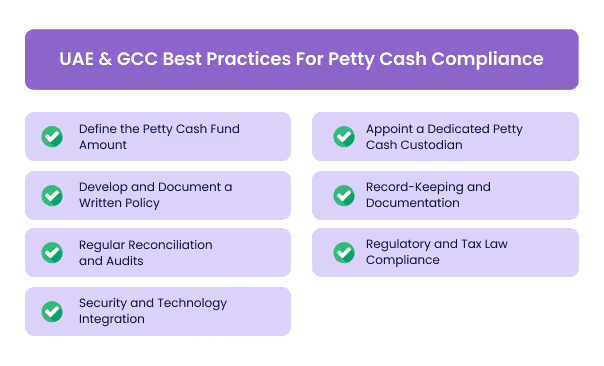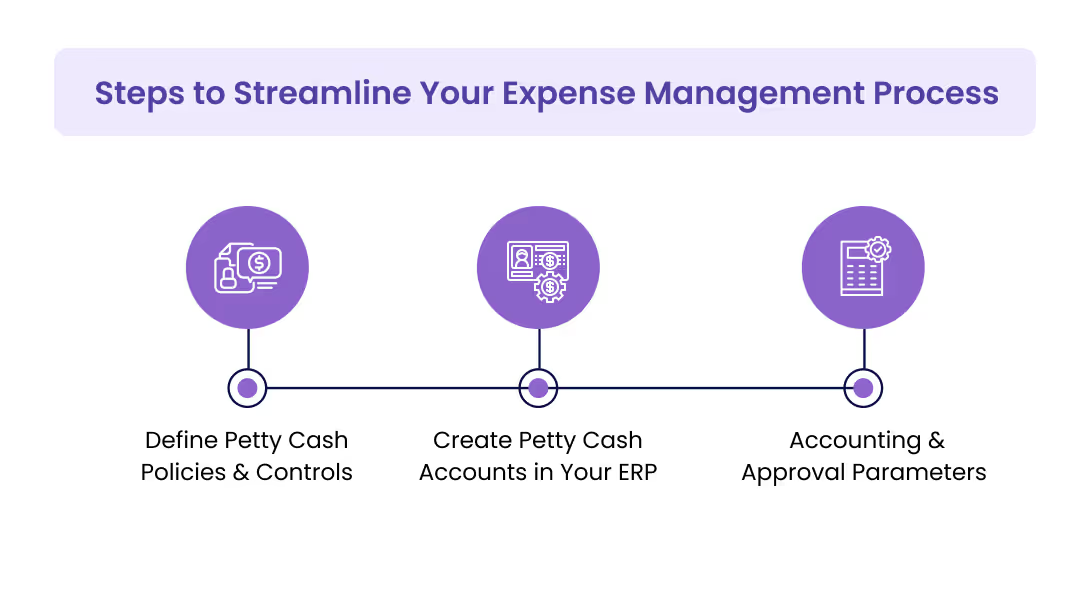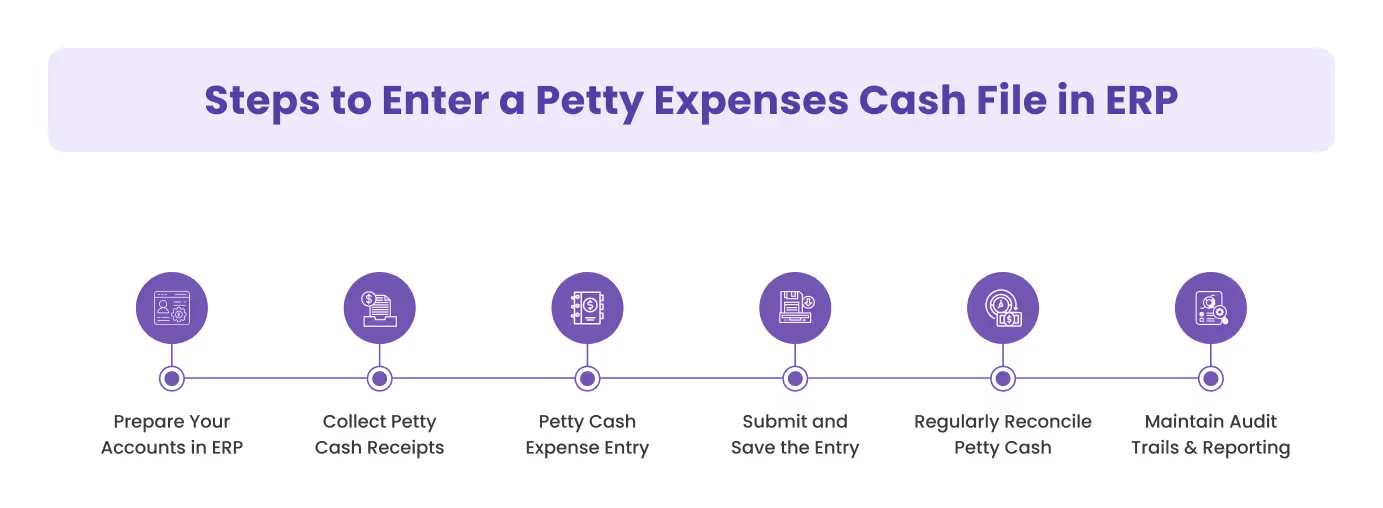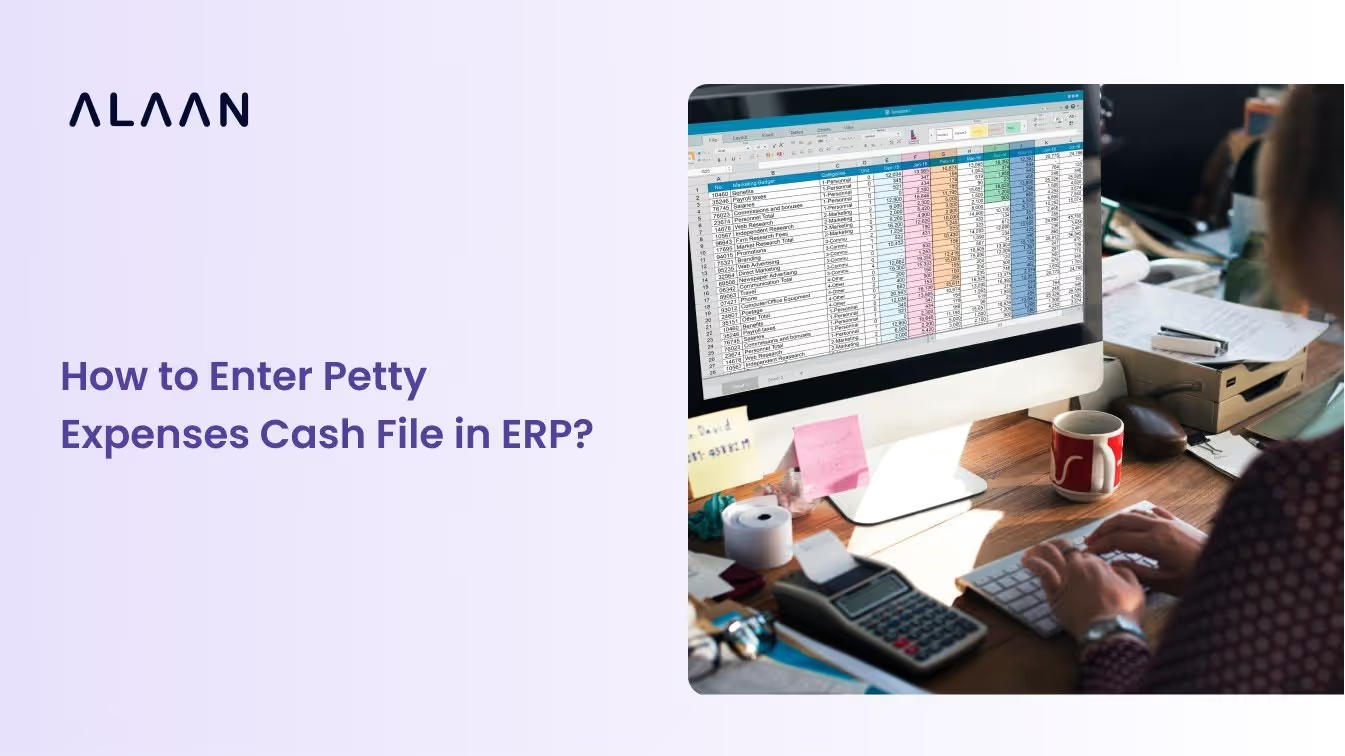Entering petty expenses cash files in ERP systems is important for financial transparency and regulatory compliance across the Middle East, especially given the UAE’s obligations under Federal Decree-Law No. 47 of 2022.
Improper documentation risks denied tax deductions, audit penalties, and increased taxable income. Research indicates that inadequate controls over petty cash are a leading cause of compliance findings, with lost or unverified receipts as their main pain point.
This blog provides in-depth guidance on how to enter petty expenses cash files in ERP platforms, presenting actionable steps, compliance frameworks, and region-specific documentation requirements.
Key Takeaways
- Accurate ERP entry of petty expenses is essential for compliance with VAT, corporate taxes in the UAE.
- Set up petty cash ledgers, clear workflow approvals, and audit trails within your ERP to align with Middle East statutory requirements.
- Middle East finance leaders should prioritise ERP solutions with strong reporting, workflow automation, and real-time tracking to support robust petty cash management.
- Automating petty cash processes in ERP enhances audit readiness, reduces errors, and improves transparency across business units.
What is Petty Cash?
Petty cash is a tightly controlled monetary fund dedicated to covering frequent, low-value business expenses that are impractical or inefficient to process through the regular accounts payable system.
In the UAE and Saudi Arabia, petty cash limits generally range from AED 183 to AED 1,100, with administration, including issuance, recording, and replenishment, governed by strict internal policies and regulatory frameworks to ensure transparency and traceability.
Typical petty cash expenditures include:
- Office Supplies: Printer cartridges, stationery, USB drives.
- Staff Reimbursements: Taxi fares for off-site meetings, minor meal costs during overtime.
- Minor Maintenance: Emergency replacement of light bulbs, payment for small-scale repairs.
- Administrative Charges: Intra-city courier fees, official document notarisation.
- Hospitality & Refreshments: Bottled water, tea, or coffee for meetings and events.
- Emergency Purchases: Medical supplies, compliance-mandated items needed on short notice.
Meeting evolving audit demands requires strict alignment with statutory provisions. Here's a precise regulatory synopsis:
UAE & GCC Best Practices For Petty Cash Compliance

Petty cash must follow strict rules in the UAE and Saudi Arabia to stay compliant with local tax and corporate governance laws. These rules help prevent misuse and ensure that expenses are properly recorded, audited, and eligible for tax deductions.
Here’s a breakdown of essential best practices:
1. Define the Petty Cash Fund Amount
- Typically, petty cash funds in the UAE range from AED183 to AED1,100, but each business should assess its own needs and transaction frequency.
- Set a spending cap per transaction, typically AED 100–200, and avoid using petty cash for salaries, large purchases, or rent.
2. Appoint a Dedicated Petty Cash Custodian
- Assign a reliable staff member as the custodian who is responsible for safeguarding funds, approving expenses, maintaining accurate records, and performing periodic reconciliations.
- Ensure the custodian never mixes petty cash with personal funds and maintains cash in a secure, locked space.
3. Develop and Document a Written Policy
- Clearly state permitted expense types, approval protocols, spending limits, and required documentation for reimbursement.
- Outline restrictions, such as prohibiting the use of petty cash for staff payroll, major supplies, or personal expenses.
4. Record-Keeping and Documentation
- Every petty cash transaction must be accompanied by a receipt or voucher describing the date, amount, purpose, and recipient.
- Maintain a digital or manual petty cash log to track all disbursements, replenishments, and remaining fund balance.
5. Regular Reconciliation and Audits
- Reconcile physical cash and receipts against the documented balance either bi-weekly or monthly, in line with your company’s policy.
- Conduct internal spot-checks and periodic audits to confirm compliance and detect irregularities.
6. Regulatory and Tax Law Compliance
- Under the UAE Tax Procedures Law and Federal Decree-Law No.47 of 2022, supporting documentation for all business expenses, including petty cash, must be retained for compliance and tax deduction eligibility.
- Inadequate petty cash systems, missing receipts, or undisciplined reconciliation can result in disallowed deductions and penalties.
7. Security and Technology Integration
- Store petty cash in a locked box or safe, accessible only to the appointed custodian.
- Consider moving to digital petty cash management and expense platforms for enhanced audit trails, real-time reconciliation, and greater visibility.
Petty Cash Best Practices vs. Risks
Effective petty cash management is essential for businesses to maintain financial control, regulatory compliance, and operational efficiency. Strong policies and procedures help prevent misuse, ensure accurate record-keeping, and support audit readiness. Conversely, inadequate petty cash controls can expose organisations to fraud risks, regulatory penalties, and financial discrepancies.
Below is a summary table contrasting key petty cash compliance best practices with associated risks of non-compliance:
How to Set Up Petty Cash Accounts in ERP Systems

Establishing robust petty cash account structures in your ERP system is essential for smooth cash handling, internal compliance, and simplified audit trails. For a precise ERP setup, the key preparatory steps are:
Step 1: Define Petty Cash Policies and Controls
- Craft a Company-Specific Petty Cash Policy:
- Set permissible limits per transaction and total fund size.
- Specify authorised expenditure types and approval authorities.
- Clearly assign responsibility to a petty cash custodian, detailing duties including fund disbursement, usage, and custody.
- Communicate procedures to all involved staff to ensure accountability and consistency.
Step 2: Create Petty Cash Accounts in Your ERP
- Chart of Accounts Setup:
- Add a petty cash account as a Current Asset.
- Name the account clearly, e.g., "Office Petty Cash" or "Branch Petty Cash."
- Use a unique account code for easy tracking and reporting.
- Departmental or Employee Sub-Accounts:
- If needed, create sub-accounts for specific branches or custodians to improve transparency and allocation control.
Step 3: Configure Accounting and Approval Parameters
- Set balance limits (minimum/maximum) to maintain control and prevent misuse or overdrafts.
- Link approval workflows to petty cash disbursements, ensuring every withdrawal is authorised in line with company policy.
Now that you are done with the preparation, ensure your organisation remains compliant and fully audit-ready by implementing the practical workflow and controlling petty cash transactions within the ERP environment.
Step-By-Step: How to Enter a Petty Expenses Cash File in ERP

Entering petty cash expenses into ERP systems in the Middle East requires rigid adherence to policy for audit and tax compliance. Below is a structured procedure tailored to regional statutory and ERP best practices:
Step 1: Prepare Your Accounts in ERP
- Ensure you have the following accounts created in your Chart of Accounts:
- Petty Cash Account (usually under Current Assets)
- Relevant Expense Accounts (e.g., Office Supplies, Travel, Telephone Expenses)
- Example: In ERPNext, petty cash is set up as a cash account, and expense accounts fall under Indirect Expenses.
Step 2: Collect Petty Cash Receipts and Documentation
- Gather all receipts and invoices related to petty cash transactions.
- Each entry should include the date, amount, purpose, and approval references to maintain an audit trail.
Step 3: Create a Journal Entry for Petty Cash Expense
- Initiate a new Journal Entry (Type: Cash or Expense) in your ERP system.
- On the Debit side, select the relevant Expense Account(s) to reflect what the petty cash was spent on.
- On the Credit side, select the Petty Cash Account to reduce its balance accordingly.
- Add additional information such as reference numbers, dates, and remarks for clarity.
- Example Entry:
Step 4: Submit and Save the Entry
- Double-check all values and that the debits equal credits.
- Submit or post the journal entry in your ERP system to update financial ledgers.
Step 5: Reconcile the Petty Cash Fund Regularly
- Regularly reconcile the petty cash ledger against the physical cash on hand and receipts.
- Record replenishment entries when the petty cash fund is topped up:
- Debit the Petty Cash Account (to increase cash)
- Credit the main Bank/Cash Account (to fund the petty cash)
Step 6: Maintain Audit Trails and Reporting
- Keep all documentation attached within the ERP for future auditing.
- Utilise ERP reports to track petty cash expenses and ensure adherence to your organisation's policies.
Addressing operational bottlenecks is vital to sustain compliance and respond decisively to these known pitfalls in Middle East petty cash management.
Common Challenges in Petty Cash ERP Management and How to Address Them
Finance leaders in the Middle East must address critical weak points in petty cash workflows to maintain compliance and financial integrity. Below, each challenge is paired with an actionable solution.
1. Incomplete or Missing Receipts
Employees may neglect to submit receipts or lose them, hindering accurate expense documentation and reconciliation.
Solution:
- Enforce mandatory digital receipt uploads at the point of transaction entry by configuring ERP forms with compulsory document fields.
- Set ERP system validations to block submissions lacking supporting evidence.
2. Lack of Clear Policies and Controls
Without documented rules and approval processes, employees may misuse petty cash or be confused about allowed expenses and limits.
Solution: Develop and disseminate a written petty cash policy outlining allowed expense types, transaction limits, approval hierarchies, and documentation rules. Enforce compliance through regular training and communication.
3. Manual Entry Errors
Human errors in key transaction fields (dates, GL codes, payees) can misstate accounts, risk VAT disallowance, and degrade data quality.
Solution:
- Deploy ERP-integrated OCR and mobile capture technologies to extract and validate receipt details automatically upon upload.
- Activate real-time validation rules in ERP for critical fields such as date, account code, and payee, preventing erroneous submissions.
- Use drop-down lists and predefined templates within ERP to standardise selection and reduce free-text input risk.
4. Delays in Approval or Replenishment
Slow approval workflows and delayed replenishments expose the business to operational bottlenecks and may violate policy or audit SLA requirements.
Solution:
- Integrate automated, role-based workflow routing in ERP so petty cash requests advance instantly to the correct approvers.
- Set up real-time escalation notifications for pending approvals or funding shortfalls, with automatic reminders based on policy-set timelines.
However, to overcome these challenges, options like Alaan’s prepaid corporate cards serve as a modern alternative to traditional petty cash funds, eliminating the risks associated with physical cash handling.

Read More: Why are UAE businesses moving away from manual petty cash management?
Use advanced automation and compliance tools to bring full transparency to your petty cash cycle. Let Allan help you manage your petty cash.
Simplify Petty Cash Management with Alaan’s Corporate Cards and Spend Platform
Manual petty cash processes expose businesses to documentation gaps, reconciliation delays, and compliance risks. With Alaan, companies in the UAE can eliminate physical cash entirely by replacing traditional petty cash with smart corporate cards—digitally issued, fully trackable, and integrated with approval workflows.
How Alaan Helps:
- Corporate Cards as a Petty Cash Alternative
Issue reloadable prepaid corporate cards to teams or departments for low-value operational expenses. Set transaction limits, merchant controls, and custom rules aligned with your petty cash policy—without using actual cash. - Real-Time Expense Tracking
All card spends are automatically logged in the Alaan platform with real-time visibility. Tags, budget limits, and built-in approvals ensure every transaction is compliant and pre-authorised. - Receipt Automation with OCR
No need to chase paper slips—employees upload a photo, and Alaan extracts the receipt data using OCR, instantly attaching it to the corresponding transaction. - Seamless ERP Integration
Push approved transactions to your ERP system, maintaining accurate ledgers, VAT documentation, and audit-ready reporting for every petty cash-equivalent expense. - Full Audit Trail & Policy Enforcement
Every transaction includes attached documentation, notes, and approvals—ensuring a clear audit trail and compliance with UAE record-keeping mandates.
Whether you're managing team-level spending in one office or across multiple UAE entities, Alaan replaces outdated petty cash practices with controlled, digitised alternatives, reducing fraud risk and simplifying reconciliations.
Wrapping Up
Effective petty cash management in ERP systems is a critical control area for finance leaders and decision-makers in the Middle East, directly impacting regulatory compliance, audit readiness, and operational efficiency.
By implementing rigorous setup, detailed transaction recording, multi-level approvals, and automated reconciliations tailored to the UAE and Saudi frameworks, businesses minimise risks of VAT disallowance, corporate tax penalties, and financial leakages.
At Alaan, we help finance teams in the UAE modernise petty cash management with prepaid corporate cards, automated expense tracking, and seamless ERP integration. Whether you're managing a single office or multiple branches, our platform gives you real-time control, compliance-ready documentation, and eliminates the inefficiencies of physical cash.
Book a free demo today and see how Alaan can simplify your petty expense process, while keeping you fully audit-ready.
Frequently Asked Questions (FAQs)
1. Can multiple users access and update the same petty cash fund in ERP?
Yes, most advanced ERPs support multi-user access with role-based permissions, ensuring each user’s actions are tracked and approvals are maintained for audit security.
2. How long should petty cash transaction records be retained in the Middle East?
Petty cash records, including receipts and ERP logs, must be retained for at least five years in the UAE and Saudi Arabia for tax and audit purposes.
3. What happens if a petty cash transaction is incorrectly categorised in ERP?
Incorrectly categorised expenses can lead to VAT disallowance or incorrect financial reporting. Immediate correction and supporting documentation update in ERP are necessary.
4. Is it possible to automate petty cash policy updates across multiple business units?
Yes, leading ERPs allow centralised policy management, enabling instant roll-out of updated petty cash controls and limits to all entities or branches.
5. Are foreign currency petty cash expenses allowed, and how are they handled?
Foreign currency petty cash expenses are permitted; ERPs require entry with exact exchange rates and supporting currency conversion documents for compliance and audit validation.


.avif)







%201.avif)